Boxing is not new in Nigeria, but female boxers have only recently started commanding the respect they deserve in and out of the ring. They still earn less than their male counterparts, though.
Ishat Oriyomi, a 23-year-old amateur boxer from Nigeria, is kicking her feet in the air in short sharp thrusts. She is standing in the middle of a circle of fellow boxers who are all copying her. She counts the kicks and the boxers, 10 men and 10 women, repeat it. The short dreads on Oriyomi’s head bob ferociously up and down to the rhythm of her movements. Her small, sinewy body moves with alacrity. Sweat drips down her face, but she doesn’t falter. She keeps moving at an insane speed. And that was just the warm-up.
Oriyomi is kicking the air with purpose and precision late afternoon on a humid day at the Brai Ayonote boxing gym at the National Stadium in Lagos. She is part of a team of 20 young men and women who have been selected for National Camp, a boxing retreat in the beautifully dilapidated gymnasium. Their training regime is strict: no smoking or drinking and no sex.
Four hours every day, from 7am to 9am and 4pm to 6pm, the aspiring boxers work out; they shadow-box, skip, run and spar. The young men and women are training for the All Africa Games that take place in Morocco from 20 to 29 August. Only 10 athletes will be selected to attend the games, the others will go back home.
One of the rules of the camp is that no media are allowed, head coach Anthony Konyegwachi tells me after Oriyomi and her colleagues have finished the warm-up. The reason I could just amble into the training camp and observe the boxers working out is standing next to me. James Emeka Ike is my long-time boxing coach, he trained me for seven years at the Hillbrow Boxing Club in Johannesburg. He moved back to his hometown eight months ago and continues to train boxers at National Stadium, his old stomping ground.
“Okay, you can stay, but no photos,” says Konyegwachi after we have thrust all our charm on him.
I sit down with Ike and watch Oriyomi work out on the bag. We lean towards each other. “That one,” he says, his eyes fixated on Oriyomi. I nod.
There are an equal number of women and men boxers in this worn-out gym with huge holes in the wooden floorboards, damp-stained walls and a beautiful wood-panelled roof that leaks when it rains. The other female boxers in the room have the same focus and determination, but none of them have Oriyomi’s speed and precision.
While the women boxers equal the men, the male coaches outnumber the women: there are four male and two female coaches. As a country, Nigeria is not known for its gender equality.
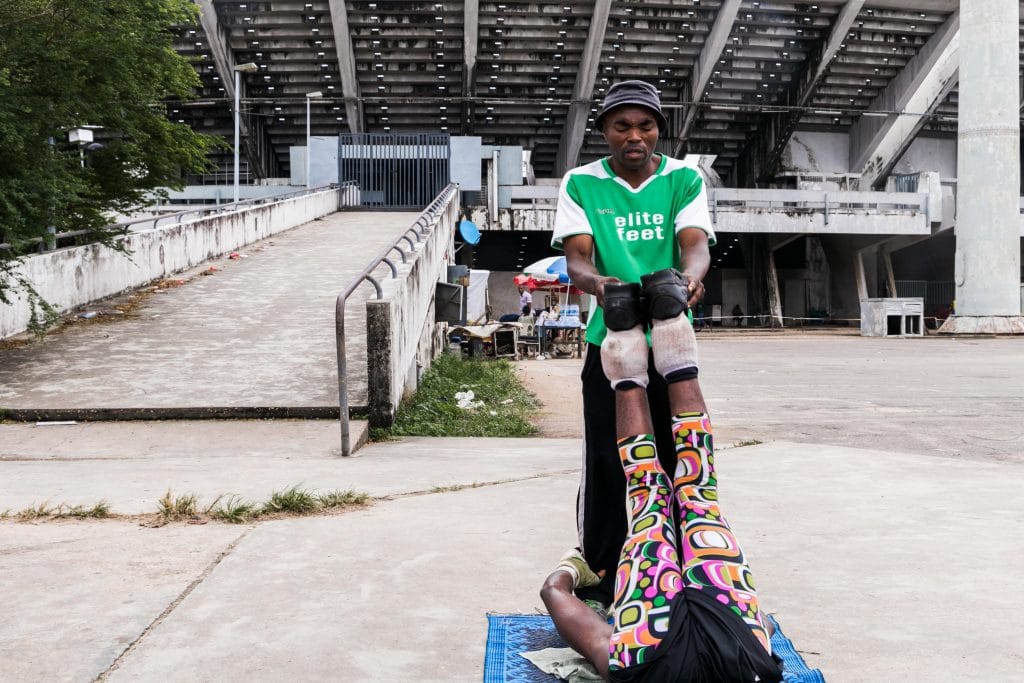
Interesting evolution
A 2015 survey of gender views among men and women, carried out by non-governmental organisation Promundu, found that “94% of men and 91% of women agree that ‘a woman’s most important role is to take care of her home and cook for her family’. Violence against women was also widely tolerated by study participants.”
While the respondents in this study rejected most tradition practices such as female genital mutilation and harmful widowhood practices, 40% of men and women reported that they had experienced domestic violence, either as a perpetrator or as a victim.
Women and girls’ access to education is hampered, especially in the northern part of the country, where academics estimate that two-thirds of girls aged 15 to 19 years are illiterate. Marital rape has still not been criminalised. The latest elections did not improve Nigeria’s abysmal number of women in Parliament, hovering around 6%.
The evolution of women boxing in Nigeria is interesting given this rather challenging set of gender conditions. Since women started boxing in Nigeria in the 1980s, attitudes towards women who engage in the sport have changed dramatically, outpacing the development of gender equality in the country.
Delta State head coach Blessing Onoko, one of the trainers at the camp, does not view women or men pugilists differently. “Women can do many things nowadays. Before, people would say: What are you doing, woman? Are you a man? But this has changed. When Laila Ali [Muhammad Ali’s daughter] took to the ring in 1999, she proved women can box. Many Nigerian women have shown us, through their achievements, that they too can box.” Onoko rattles off the names of internationally well-established women boxers: Milicent Agboegbulem, Helen Joseph, Edith Agu Ogoke.
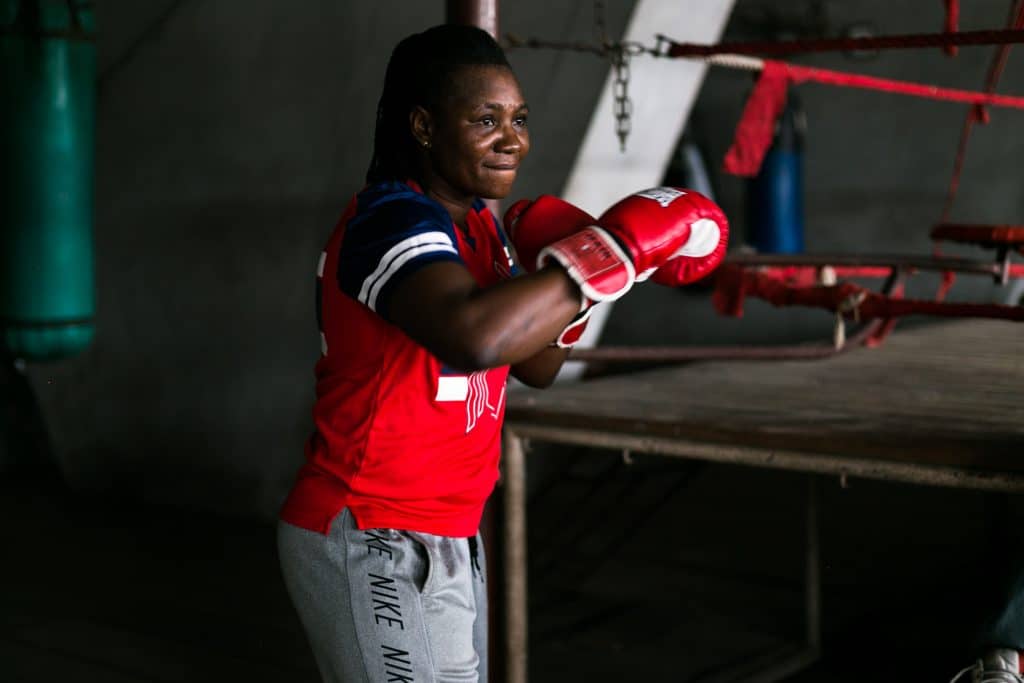
‘Boxing mother’
Yabbo Stephen is one of two female coaches at the camp. Oriyomi refers to Stephen as her “boxing mother”. She made a name for herself in the 1980s as one of the first female boxers in Nigeria, long before women were accepted in professional boxing.
“In 1986, just after I had finished secondary school, I was playing football but I wanted to box. There were no women boxing at the time.” Her peers and her parents declared her crazy, but Stephen pushed through and, in 1989, she fought in a national competition called All Stars. “I weighed 48kg at the time,” says Stephen. “My opponent was 58kg, so much heavier than me. This meant I lost.”
The evolution of Nigerian women boxing was also influenced by the pace of international developments. The first boxing match sanctioned by a professional boxing association took place in Sweden in 1988. The first boxing world championship for women was held in 2001 and women boxing was only accepted as an Olympic sport in 2012.
Now Stephen trains young women who have many more opportunities. “I tell my girls when they’re in the ring, they should look at their opponent as an ant, do not view her as a person.” Oriyomi nods affirmatively.
While there seems to be no difference between the men and the women boxers at the boxing gym, attitudes towards female boxers in Nigerian society are still judgemental. An interviewer on Battabox, a Nigerian YouTube video show, asked Lagosians on the street if they would ever date a female boxer. “Only if I have no money, because I like a feminine, smooth-looking girl,” one of the men said. Pretty much everyone else just answered, “No!”
Interestingly, most of the women interviewed did not encounter such resistance. Oriyomi’s husband introduced his then girlfriend and high school sweetheart to the sport when she was 15 years old. At that young age, Oriyomi had already gone through a lot of upheaval.
Her parents got divorced when she was young and she lived with her dad and his new wife. The wife treated her like a servant, stopped paying her school fees and eventually she threw the teenager out of the house. At 13 years old, Oriyomi was homeless and pregnant. Her 11-year-old son now lives with her mother. “He comes to see me fight and he is always proud of his mum.”
When Oriyomi learned how to box, she also found a way out of a tight corner in life, into a brighter future. She says boxing saved her life.
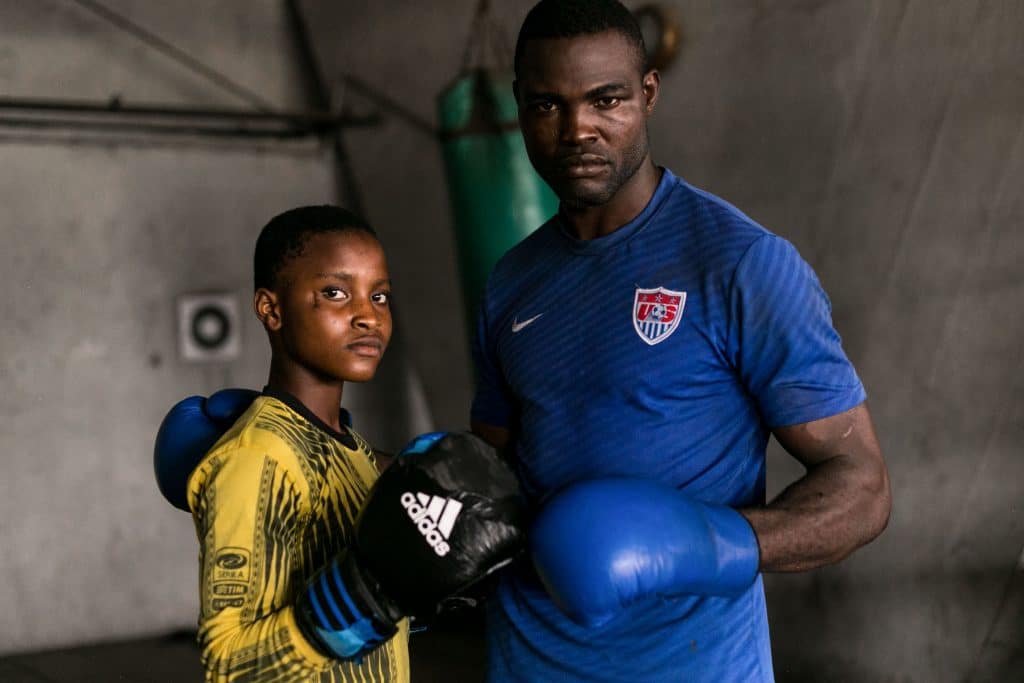
Dystopian but lively stadium
The state of the multipurpose National Stadium complex in Surulere, Lagos, is a typical Nigerian phenomenon. The 45 000-seater stadium hosted the Africa Cup of Nations football tournament in 1980 and 2000. It started to show signs of wear and tear in 2002. Neither the government nor the private sector invested in its upkeep and the place started falling apart.
After its official closure in 2004, however, Lagosians moved in and started a wide array of activities. There are religious gatherings, youngsters breakdancing, roller-skating and cat walking. Bars, coconut sellers and restaurants blaring music compete for attention. The Olympic-sized swimming pool is open for business. The run-down tennis courts, hockey and basketball fields are all being used. The stadium must have looked impressive when the complex opened in the 1970s. In 2019, however, it looks dystopian and weirdly lively at the same time.
Nigerians are known for their self-reliance, citizens have responded to their government gradually withdrawing from public service delivery with initiative and enterprise. Most homes are kitted out with generators and boreholes in the back yard, because the government barely supplies electricity or water.
At the stadium, citizens have continued where the government left off. Sports and recreation continue, with or without government support. National Stadium is a popular hangout, heaving with fun and activities against the backdrop of an enormous structure quietly rotting away.
In the equally dilapidated second boxing gym at the stadium, coach Adeniji Adele Adeboyega, also known as AAA or Triple A, sits on a chair close to the entrance. There is a ring in the middle of the crumbling gym, a few boxing bags are attached to the ceiling with iron chains. Little bits of stuffing float to the ground as boxers whack the bags.
AAA blows his whistle and 15-year-old Olamide Balogun stops shadow-boxing. She takes a few steps, breathes in and out, and watches her coach furtively. When he blows the whistle a second time, she returns to her shadowy opponent, moving around, jabbing repeatedly, followed by a right hook, uppercut and she moves back, bobs and weaves, her flow somewhat hampered by the beat up trainers on her feet, which are clearly a few sizes too big.
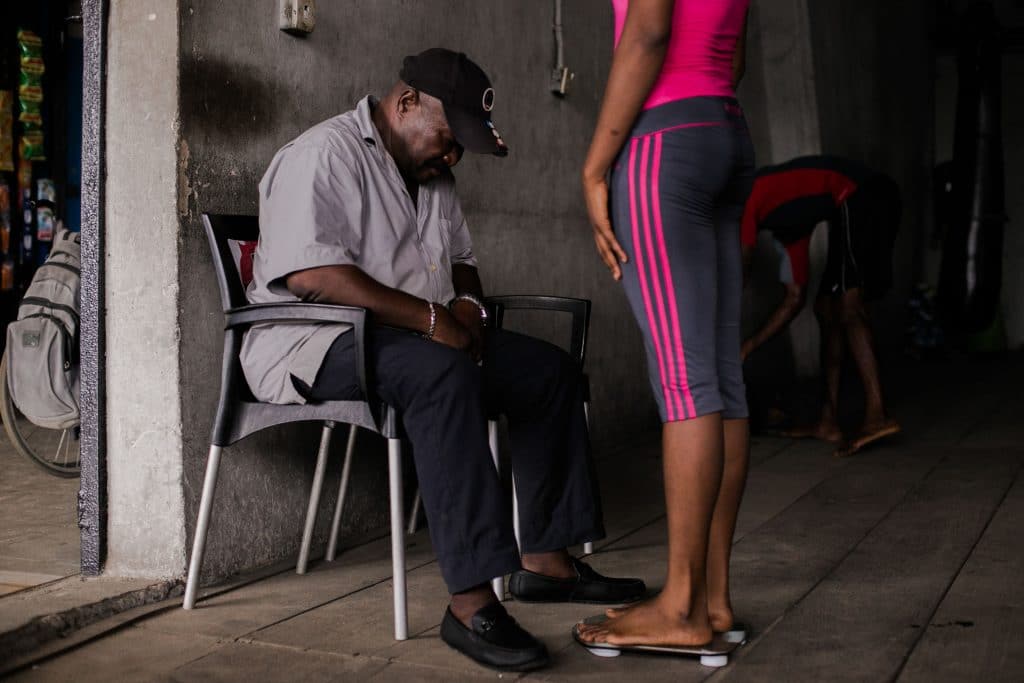
School gangs
When she has finished training, I ask Olamide Balogun if the fish-grate scar under her right eyebrow was caused by a boxing fight. Olamide is a slender girl who looks young for her age. She is from a poor neighbourhood in Lagos and she tells me her family has always struggled to make ends meet.
“This is from a fight between gangs at my school. It happened when I was 10 years old. They had guns and threw bottles at us and one broke on my face,” she says in a small voice. “It’s one of the reasons my dad started to teach me how to fight,” she adds, pointing at him.
Olamide’s dad, Fartai Balogun, is in his 30s. “My daughter, she can fight,” he says, looking at her with pride. Olamide seems to physically grow a bit in that moment.
“We have no money to pay for her school. But I hope she will have a boxing career,” her father continues. “She will make me proud, her future is bright,” he beams.
This sweet interaction between father and daughter reminds me of my own childhood. I had to deal with bullies and street fights in the small village where I grew up. When my 10th birthday neared, I dragged my father to the local toy shop and asked him to buy me a kid’s boxing bag and gloves, because I wanted to learn to defend myself. “Boxing is not for girls,” my dad sadly ruled.
Boxer and soldier
Both Oriyomi and Olamide, young women born a generation after me on a different continent, do not face these barriers from the men in their lives. Oriyomi’s husband and Olamide’s father taught them how to land a good jab. And while the Battabox interviewees might conclude that they would never ever ever date a female boxer, gender norms in the Nigerian women’s boxing world itself – comprised of a handful of professional female boxers and about 1 000 amateur women boxers – have clearly shifted.
Olamide’s wide-eyed expression becomes even more incredulous and shy when Edith Agu Ogoke enters the gym. She is a robust, 29-year-old professional boxer who is on her to way to winning a world title.
Ogoke – her middle name, Agu, means lioness in Igbo – is a soldier in the Nigerian army and she walks like one: fast, efficient and with authority. She wraps her hands with the speed of light and gets into the ring where a coach is waiting for her, his pads in mid-air.
The middleweight southpaw boxer competed in the 2012 Olympic Games, where she lost in the second round of the semifinals. She went on to win a bronze medal at the Commonwealth Games in 2014. She won gold at the All Africa Games in 2015 and is still undefeated on the continent.
Like Stephen, Ogoke did not tell her parents she was boxing. When she finally “came out”, her parents ignored her for a few fights. “But after a while, they realised they don’t have a choice. I was the first female Nigerian Olympian boxer and I am undefeated in Africa. Now, they are proud of me.”
When I ask what her husband thinks of her career, she scoffs. “Of course he is proud of me! He has my back. I have a dream and my dream is boxing. My next goal is a world title.”
Uptick in the sport
Many men and women boxers in Nigeria, like Ogoke, have a connection to either the police or the army. The Nigerian military and the police are traditional spaces where there is some investment and resources for the sport.
Sports in general and boxing specifically in Nigeria are marred by a serious lack of financial investment and sponsorship. Boxing promoter Saleh Fawaz tells me professional boxers in Nigeria earn on average $200 to $400 a fight.
Fawaz, a Nigerian-born Philippine-Lebanese man who speaks fluent pidgin English, is the director of Saleh Gloves Promotions. Promoting women boxing can be a daunting goal, because there are only seven or eight professional boxers in the country, which means it can be very difficult to find an opponent. And then, of course, there is the good old gender pay gap. “Professional male boxers earn about twice as much as women. But even men might earn $400 and that will barely cover transport costs for a month.”
Despite these tough circumstances, Fawaz has noticed an uptick in the popularity of the sport. Gotv, a Nigerian television station run by major satellite service MultiChoice, broadcasts fights regularly, providing much-needed exposure. Slowly, corporate brands have started to sponsor fights, adding glamour and entertainment. More promoters have become involved and this has led to a revival, there are more resources than there were 10 years ago.
Fawaz says female boxing is part of this revival. “The mindset around women boxers in Nigeria has definitely changed. Women won many medals in amateur boxing and internationally, they also put up a really good fight. Adijat Gbadamosi, a Nigerian junior boxer, won three medals, gold in the African championship in Morocco, then she won gold again in Algiers. She also won a silver medal at the junior Olympics in Argentina in 2018.”
Gender and politics
For a long time, boxing was not accessible to Nigerian women. “The British introduced the Boys Club Movement during the thirties in Nigeria. Boys Clubs were set up throughout the country to steer young men away from deviant behaviour and to instil a sense of discipline and confidence in them,” says Michael Gennaro, a boxing historian at Bossier Parish Community College in the United States, who wrote his doctoral thesis on the history of boxing in Nigeria.
Later, Girls Clubs were started, but they were premised on an entirely different message, according to Gennaro: “‘A woman’s face should be adored, not punched.’ ‘Women who box will beat up their husbands and will not make a good wife or mother.’ ‘Female boxers are like men.’ These attitudes were prevalent in both Britain and Nigeria. Young girls could engage only in certain gendered types of sport.”
In the 1960s, during the heyday of Nigerian boxing, women were allowed to train but not to fight. In 1957, Hogan Bassey was the first Nigerian to win a world title. In 1962, a year before Nigeria declared itself a republic, Dick Tiger beat American boxer Gene Fullmer and became the world middleweight champion. Tiger went on to win the light heavyweight world championship in 1965. But this high for the country soon turned into a low.
Tiger, an Igbo man, supported the Biafran state during the civil war from 1967 to 1970, which saw different ethnic groups in Nigeria fight each other for territory and power. The ruling northern government isolated the Igbo people and starved a substantial number to death. “Tiger’s partisan alliance alienated a lot of people and led to a decline in the popularity of boxing,” says Gennaro.
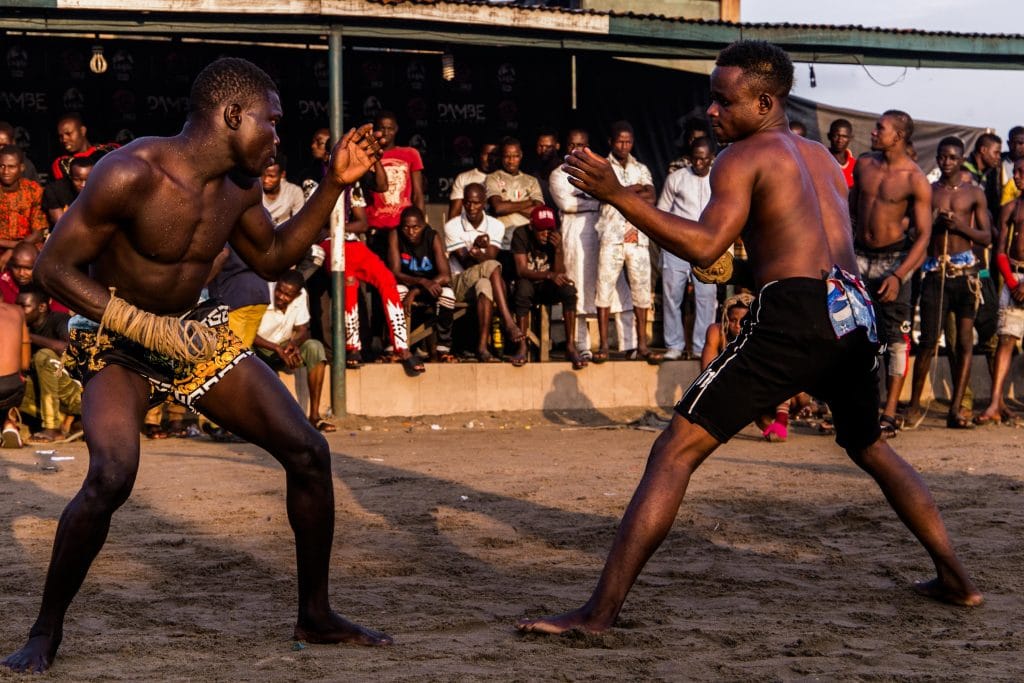
Ancient roots
While boxing in Nigeria is in some ways an imperial import, it has roots predating the arrival of the British. Dambe fighting, also known as Kokowa, is an ancient Nigerian martial art, originally practiced by the butcher caste of the Hausa tribe in Nigeria and Chad. Dambe competitions in villages in the north were part of harvest festivals.
Dambe fighting has recently seen a revival and various Dambe promoters have sprouted in Lagos. The sport is no longer practiced exclusively by Hausas, other Nigerian ethnicities are also fighting. YouTube videos of Dambe fights attract millions of viewers online.
In Alaba Rago, a far-flung and mostly Islamic suburb in Lagos situated alongside the Lagos-Badagry Expressway, the sound of drumming and chanting can be heard outside the Dambe arena. Aminu Baturu Kuchiri, the national chairperson of the Dambe fighting association, meets me at the entrance and leads me through a thick cloud of marijuana smoke to the “ring”, which is really a sandpit, bordered by spectators in elevated seats. Musicians play drums and flutes and sing war songs through a microphone, which produces a crackling, distorted sound.
In the ring, several groups of young men are warming up. The setting sun casts a deep yellow glow and long shadows over the audience and the fighters. Suddenly, two men approach each other. They lift their unwrapped left arms up. In Dambe fighting, the unwrapped left arm is called “the shield” and used to defend. The right hand is wrapped in cloth and bound tightly with a rope called “kara”. Before the sport was popularised, fighters would rub a sticky resin on the ropes and roll it in broken glass, which would lead to bloody and sometimes lethal fights.
In Alaba Rago though, there are safety rules. The rounds are short and whoever touches the sand, even with a finger, loses. Punching and kicking is allowed, as the ancient martial art used to include wrestling.
I ask Baturu if there any women Dambe fighters. He laughs. “There are some women fighters, but it is not accepted. If I see a woman fighting, I won’t stop her, but no one wants to watch women fighting.”
As we are leaving the arena, Baturu grabs my arm. “Look, she is the only female Dambe fighter in Alaba Rago,” he says, pointing to the balcony of a ramshackle house. A woman looks back at us and waves. When she comes down to meet us, I see her body is covered in scars. “I fight men,” is all Rejoice Endurance cares to say. She shrugs and smiles before we take a bunch of selfies together.
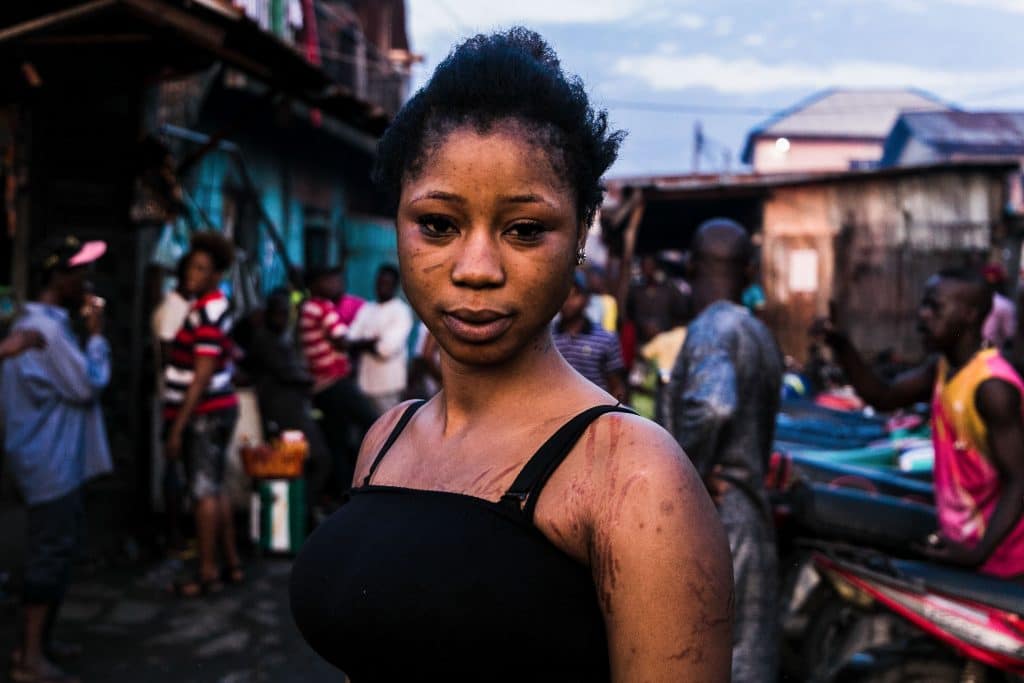
Sparring for selection
Towards the end of a long week, Oriyomi and her colleagues are getting ready for the weekly sparring contest. The sparring rounds are important, as they provide input for the selection of boxers who will travel to Casablanca on 13 August to compete in the All Africa Games.
Oriyomi, as a flyweight boxer, is up first. Her opponent is a muscular young woman.
In the ring, her opponent’s movements are stiff and off whereas Oriyomi moves fluently, stepping in for a jab, ducking a hook, moving in for an uppercut to the midriff.
Although no winners are announced when the three rounds are done, both Ike and I know: Oriyomi won.
Main Photo: 11 July 2019: Princess Oluwapelumi Adewale, a 17-year-old boxer in a training session with her coach at the National Stadium in Lagos, Nigeria.
This article was first published by New Frame.
